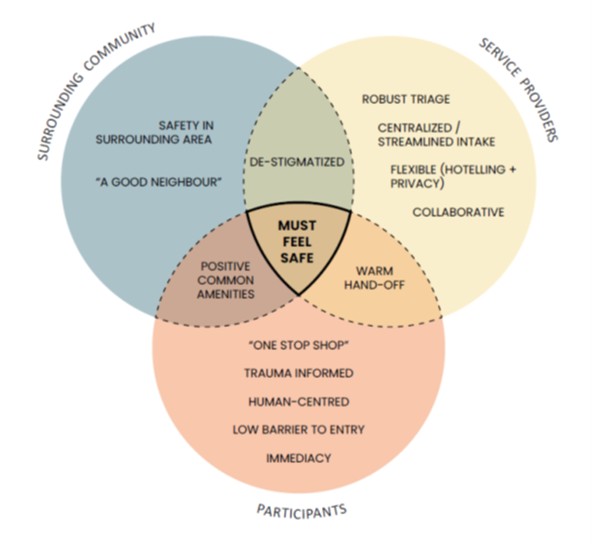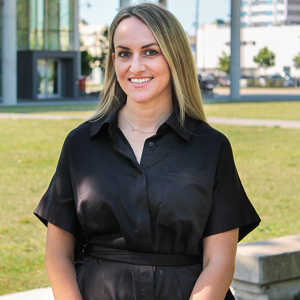The Housing Hub Vision
The Housing Hub
By Whitney Kitchen
October 2022
Origins and Current H4 Model
The Homelessness & Housing Help Hub (H4) began as an emergency response to the Covid-19 pandemic to provide social distancing and safe daytime space to individuals experiencing homelessness. The City utilized redeployed staff from various municipal departments to operate the program out of an underutilized recreation centre in the downtown core. Since opening its doors in 2020, H4 has become a well-loved space that has adapted its programming by listening to the needs of the population. It has evolved to provide low barrier service connections to necessary resources, including housing assistance, health care, income support, justice services, addiction and mental health support. The success of the program is a result of being a consistent anchor in the community that allows for persons who are not traditionally connected to supports or who are underserviced to access immediate services.
Program Success & Attendance
As of June 2022, H4 has welcomed over 2,200 unique clients, with 59,654 visits. The program averages attendance between 110-150 unique visitors per day on most days, and often reaches capacity shortly after opening the doors. The H4 has assisted 168 individuals in exiting homelessness through securing permanent housing.
Future Housing Hub Vision
A vision for a new permanent Housing Hub was presented to Windsor City Council in July of 2021 as a response to the successes achieved at the current H4. The proposal recommended engagement with a consultant to perform stakeholder, user-group, staff, and service provider consultation to develop recommendations reflective of the needs of the community for potential locations, preferred design elements, and future engagement strategies. The City of Windsor retained Glos Arch + Eng’s services to perform consultations, compare best practices, and further solidify the Hub’s Vision.
The critical elements of the Housing Hub vision were identified through consultation. Must Feel Safe quickly became the guiding principle for the development of the Hub Vision as it was a central theme in consultations with persons experiencing homelessness.

Location
The physical location of a purpose built Housing Hub requires further strategic searching and in depth community consultation. Many service providers cited 2km as the maximum walking distance the average participant might travel on foot to seek other relevant resources. This places the future Housing Hub within the parameters of Downtown Windsor with close proximity to emergency shelters, harm reduction pharmacies, and additional social services and supports.
Programming
Capacity space and public health constraints at the current H4 has required the program to prioritize those experiencing homelessness and conversely refer those at risk of homelessness to other community providers. The proposed Housing Hub will serve both populations and provide Coordinated Access to act as a front door to all services on the housing and homelessness continuum. Coordinated Access functionality could provide intake and screening for emergency shelter, connections to housing first programming, complete social and affordable housing applications and By Names Prioritized List documentation, and facilitate community referrals. The program allows for a person-centered approach to tailor interventions to the needs and readiness of the participant. Individuals can attend the Housing Hub to meet their basic needs and access drop in space or receive a wide spectrum of supports from various agencies to address deeper needs.
In addition to housing support, the following sectors are welcomed on site to provide low barrier service connection for persons accessing HUB support:
- Income Supports including Ontario Works and ODSP
- Education & Employment Training
- Legal & Justice Services
- Mental Health and Addiction Services
- Cultural Supports
- Spiritual Aid
- Gender & Sexuality
- Primary Care & Psychiatry
- Counselling
- Recreation
Amenities
The consultative process highlighted the need for the Hub to include intentional design for flexible spaces that can change with the needs of the community, including civic emergencies, natural disasters, and peak demand of services in winter months. Improved access to technology through phone banks and computers was an identified need for improvement. The Hub is set to include a quiet space for daytime rest and more active spaces for programming and recreation. The top requested amenities by persons experiencing homelessness were improved hygiene facilities with the addition of showers and laundry.
Housing
The Housing Hub proposal includes 64 units of single occupancy flexible housing suites to meet the specific needs of highly complex individuals and vulnerable underserved populations experiencing homelessness. The solution to homelessness is housing and the necessary supports required to stabilize housing placements. Design elements for the housing suites will be rooted in trauma informed design to promote dignity and decrease conflict, while considering cultural safety and Indigenous representation.
Next Steps
The City of Windsor is looking to continue to engage with a consultant in order to secure a property that meets the minimum requirements identified through the consultation process. A Project Steering sub-committee will look to secure the funding required for the Housing Hub. Further community consultation with members of the public and stakeholders will further assist to inform site selection and ensure the fidelity of the original scope continues to be met. Dialogue with other sector organizations will be pivotal in ensuring the continued success to move individuals from an experience of homelessness to wellness.
About the Author
Whitney Kitchen is a Registered Social Worker who graduated from the University of Waterloo with an MSW in 2021. Currently Whitney is a Coordinator of Housing Administration and Development with the City of Windsor responsible for co-leading the Housing Hub project which currently provides housing, health and support for over 100 unique individuals daily. Whitney has an extensive history of frontline social work experience in justice, mental health, addictions and homelessness. She has led a number of local initiatives including: chairing the local situation table which collaboratively addresses risk mitigation, providing mental health training for law enforcement and seminars on justice involvement and its impact on disenfranchised populations. Her passion for underserved populations drives her work for advocacy and system change.
